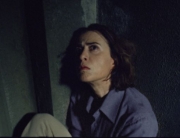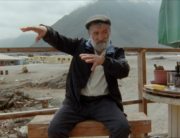
Santiago Figueroa, left, and Sergio Schmied as Beethoven (Cinema Guild)
Young college students, all men in suit and tie, sit at their desks, surrounding a bespectacled gentleman, who easily could be the grandfather of any of his classmates. All have their eyes closed, listening to the teacher translate poetry from French to Spanish when an alarm clock stuffed in the older man’s coat pocket goes off, alerting him to take a pill, which he washes down with a swig of booze.
Another clue that this film takes place in a slightly askew and insular world is that the teacher goes by the name of Jean Giono (Christian Vadim), the noted French author (his novel The Horseman on the Roof is about to be published during his fictional exile from France). Although Giono was famous for his pacifist views and was wrongly accused as a Nazi collaborator, he was not a refugee in a provincial Chilean port town after the war. (This is not the first time Chilean director Raúl Ruiz has turned to the novelist; he adapted the novel Les Ames Forts in 2001.) Possibly Giono stands in for what the elderly man from the classroom, Don Celso (Sergio Hernandez), dreams of becoming.
Since he was a boy, Celso has gone by the name of Rhodo—as in Rhododendron, not the shrub, but rather a fish, or so he says. But what’s in a name? Throughout the film, Rhododendron becomes a word in search of meaning. Most likely, Celso has chosen it because of the way it rolls off the tongue.
Though we see a man in his 70s, all of his memories that infuse this fanciful but firm-footed piece are from his younger years as a preadolescent (Santiago Figueroa) in knee breeches and a pullover sweater, with a head stuffed with trivia—the kid even knows who composed the little-seen opera La Juive. He’s such a serious boy that his imaginary encounters with Long John Silver and Ludwig von Beethoven are earnest, not whimsical. Beethoven may have his place on film soundtracks, but this is probably the first time that the composer has appeared spending Saturday at the movies.
Rhodo’s a natural-born storyteller, prone to exaggeration with a strong sense of drama, or at least that’s how Celso remembers himself. The boy’s a young Walter Mitty spinning his own secret life, though without the heroics. Instead what the viewer sees is how Celso would like to tell his life story.
It’s as though he has taken a friendly piece of advice to the extreme, “Without ideas you lose your youth.” Celso clings to his, not entirely growing out of them. His formative years have stayed with him—or perhaps entrapped him. Whether he’s seen as a boy or at the age of retirement from his nondescript office job, the dual Rhodos live in a world where time has stopped in the late 1940s. Though filmed in HD, the film has a Technicolor vibrancy with its rich colors, and everyone and everything look out of a low-budget 20th Century Fox film.
Ruiz loosely adapted the script from the stories of Chilean writer Hernán del Solar, for whom, according to Ruiz, “Daily life co-exists with the dream world, with tenderness and cruelty. His fiction springs from complete freedom of inspiration.” Here memories float one after another in any order, filmed in a deliberately artificial and elegant manger, with densely literate freeform conversations that drift from idea to idea. The film’s like wandering unescorted in someone else’s mind, and knotty compared to Ruiz’s recently acclaimed Mysteries of Lisbon.
The mood takes a sharp turn when Celso’s yarns become noirish as he contemplates the long goodbye, or perhaps a death wish. (It’s not a spoiler to mention that even in the afterlife the man’s isolated—he mentions at one point that he’d rather be alone than surrounded by fools.) Whether from paranoia or a premonition, he believes someone has been hired to kill him. As also the narrator of his story of impending death, Celso’s winging it, making up the mayhem as he goes along. Even his characters—hit men, a sultry landlady, a flaunting prostitute—are puzzled by the plot, and search for words, motivation, and meaning. Hello, Pirandello.
Ruiz died at age 70 in 2011 from a lung infection, barely more than three months after he completed this film. Knowing this fact brings more resonance, but regardless of its production history, it’s the film that lingers. It becomes more beautifully melancholic as you remember it.
















Leave A Comment